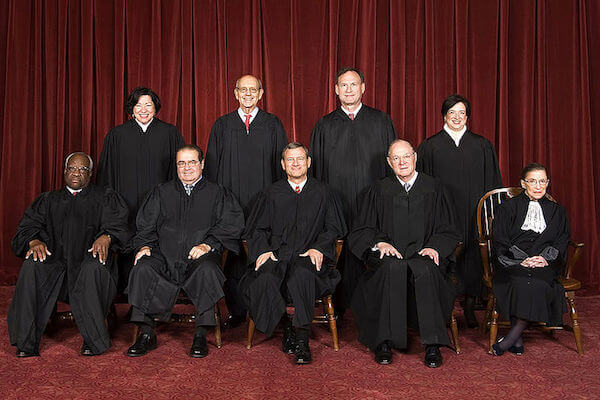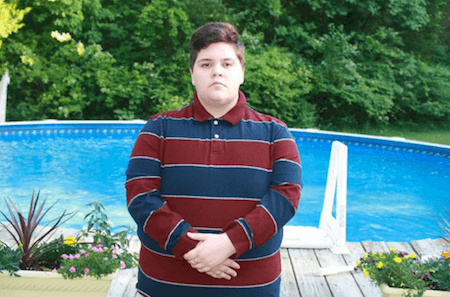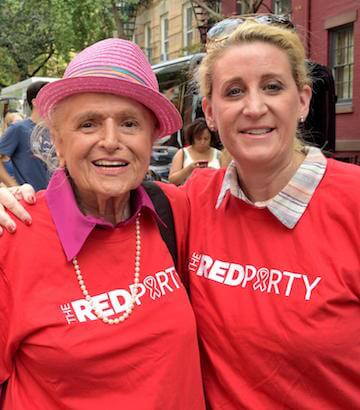The US Supreme Court sent the victory by Robert Ingersoll and Curt Freed in their discrimination suit against Arlene’s Flowers and its owner, Barronelle Stutzman, back to the Washington State Supreme Court for “further consideration.” | ACLU OF WASHINGTON
On June 25, the Supreme Court finally acted on a petition by an anti-gay litigation group that sought review of a unanimous Washington State Supreme Court decision affirming a lower court ruling that found a florist had unlawfully discriminated in refusing to sell wedding flowers to a same-sex couple.
The high court granted the petition and vacated the State Supreme Court ruling, sending the case back there for “further consideration” in light of the June 4 decision in Masterpiece Cakeshop v. State of Colorado.
The Washington Supreme Court’s ruling had unanimously affirmed the Benton County Superior Court’s decision that Arlene’s Flowers and its proprietor, Barronelle Stutzman, had violated the state’s Law Against Discrimination and its Consumer Protection Act. Representing the business and its owner, Alliance Defending Freedom (ADF) petitioned the US Supreme Court last July.
Because the high court had granted review in Masterpiece Cakeshop shortly before that, it did not put the Arlene’s Flowers case on the agenda in any of its conferences before issuing its Masterpiece ruling.
Citing recent Masterpiece Cakeshop decision, Supreme Court orders “further consideration”
Shortly after Washington State began issuing same-sex marriage licenses, Robert Ingersoll and Curt Freed went to Arlene’s Flowers to order floral decorations for what they expected to be a big wedding. Ingersoll had been a frequent customer of Arlene’s and gotten to know Stutzman. When he asked her to provide flowers for his wedding, however, she told him that she could not design flowers for his wedding because of her relationship with Jesus Christ. She gave him the names of three other florists and claims he said he understood her decision and “they hugged before he left.” But Ingersoll and Freed talked about their experience at Arlene’s with others, generating news reports that spurred the state’s attorney general to take action.
Around the same time that the state’s lawsuit was filed, Ingersoll and Freed, represented by the American Civil Liberties Union, filed their own suit, and the two cases were consolidated for trial. The Washington courts found the defendant had violated the statutes and was not entitled to any First Amendment defense.
Several days after the Masterpiece ruling, ADF filed a supplementary brief in the Supreme Court on behalf of Arlene’s Flowers and Stutzman urging the court to grant review, vacate the state court ruling, and send it back there for consideration in light of Masterpiece.
The State of Washington and Ingersoll and Freed quickly filed responding briefs, arguing that ADF’s petition should be denied because there was nothing in this case’s history suggesting anything like the grounds on which Masterpiece had been decided.
In its supplementary brief, however, ADF mounted several arguments contending that Masterpiece could require a reversal in this case because of “hostility” to religion by the State of Washington.
First, ADF argued, the attorney general’s action in filing suit against Stutzman in both her professional and personal capacities, reacting to news reports and without the same-sex couple having filed their own discrimination claim, demonstrated hostility to religion.
Second, ADF argued, the trial court’s reliance on and quotation from a case the attorney general cited involving a retail store that refused on religious grounds to serve African Americans amounted to comparing Stutzman to the “racist” owner of the store, further evincing “hostility” to her religion.
“The State, in short, has treated Barronelle with neither tolerance nor respect,” ADF argued, quoting Justice Anthony Kennedy’s phrase from Masterpiece.
ADF also pointed to the state’s failure to initiate litigation against a Seattle coffee shop owner who, according to a radio talk show, had “profanely berated and discriminated against Christian customers,” apparently aiming to draw an analogy to a situation described by Kennedy in Masterpiece where the Colorado Civil Rights Commission dismissed charges against three bakers who had refused to bake anti-gay cakes in the wake of the Commission’s ruling against Masterpiece Cakeshop.
The State of Washington and the ACLU quickly filed responsive briefs, disputing the accuracy and relevance of ADF’s brief.
For one thing, unlike Masterpiece Cakeshop, Arlene’s Flowers did not raise any issue in its original petition to the US Supreme Court about the state’s “hostility to religion” and so could not now introduce that issue into the case.
They also pointed out that a party to litigation citing a case that supports its legal position cannot be considered “hostility to religion.” After all, Justice Kennedy cited a similar federal case involving a restaurant that refused to serve African Americans in his opinion in Masterpiece to support the point that it is well established that there is no general free exercise exemption from complying with public accommodations laws. This doesn’t show hostility to religion by the court.
And, the attorney general argued, his filing a discrimination complaint, in itself, is no evidence of animus or hostility, but rather merely an indication he is doing his job. He “played no adjudicatory role in the process of deciding this case,” his brief noted.
What Masterpiece required was that the forum not be hostile to religion. Here, the forum is the state court, not the parties to the case, including Washington’s attorney general.
The brief from the AG pointed out that there was doubt about the accuracy of the talk radio report of anti-religious bias cited by ADF, but even though nobody filed a discrimination claim against the coffee shop owner in question, the chair of the Washington Human Rights Commission “publicly announced that she would send a letter to the business owner explaining Washington law,” and the owner subsequently announced, unlike Barronelle Stutzman, that “he will no longer refuse service to the customers he initially turned away.”
In contrast, in Masterpiece, Justice Kennedy counted as evidence of hostility that the Colorado Commission had rejected discrimination claims against three bakers who declined to make anti-gay cakes while ruling against Jack Phillips for refusing to make a same-sex wedding cake. (To be clear, Justice Stephen Breyer, in his concurring opinion joined by Justice Elena Kagan, challenged Kennedy for ascribing hostility to the different ways the Commission handled the two situations, finding them clearly distinguishable.)
A strong argument can be made that there is no basis for ordering “further consideration” of Arlene’s Flowers in light of Masterpiece. The Supreme Court will often follow up on a decision by mopping up similar cases that had been on hold and sending them to the lower courts to determine whether its recent decision would require a different result. However, if the lower court ruling is clearly consistent with the new decision, it is not uncommon for the high court to simply deny the petition for review.
Here, the court’s action may be a reaction to ADF’s assertion there is evidence of hostility to religion in the Washington court proceedings. And, it is a common practice on the court to send cases back for reconsideration even if only a single member is troubled about possible inconsistency.
On the other hand, the court’s action on Arlene’s Flowers may signal some ambiguity about exactly what it was holding in Masterpiece. The Supreme Court’s decision to vacate the Washington Supreme Court’s ruling is certainly cause for concern, since the Arlene’s Flowers ruling is totally consistent with what Kennedy said about the free exercise and free speech arguments ADF advanced in Masterpiece. A careful reading of Kennedy’s opinion there shows that the court did not back away, at least overtly, from its prior precedents holding that there is no free exercise exemption from complying with laws banning discrimination in public accommodations.
Time will tell whether a firm majority of the Court is actually ready to reassert that position on the merits in an appropriate case. It could be that the court wants to consider the underlying legal questions on the merits only in a case without any complications involving the nature of the lower court proceedings.
Meanwhile, opponents of religious exemptions can take some comfort from the actions by the Arizona Court of Appeals and the Oregon Supreme Court — the latter of which refused to review a court of appeals ruling that found impermissible anti-gay discrimination in another wedding cake case — in the weeks following the Masterpiece ruling.



































